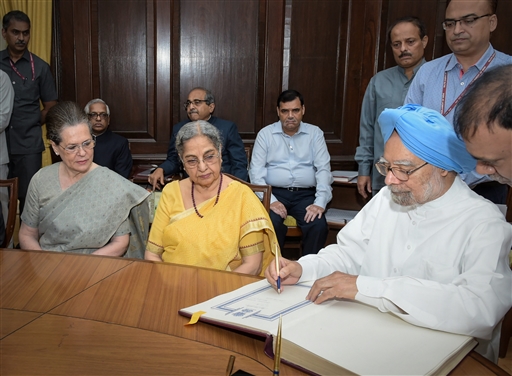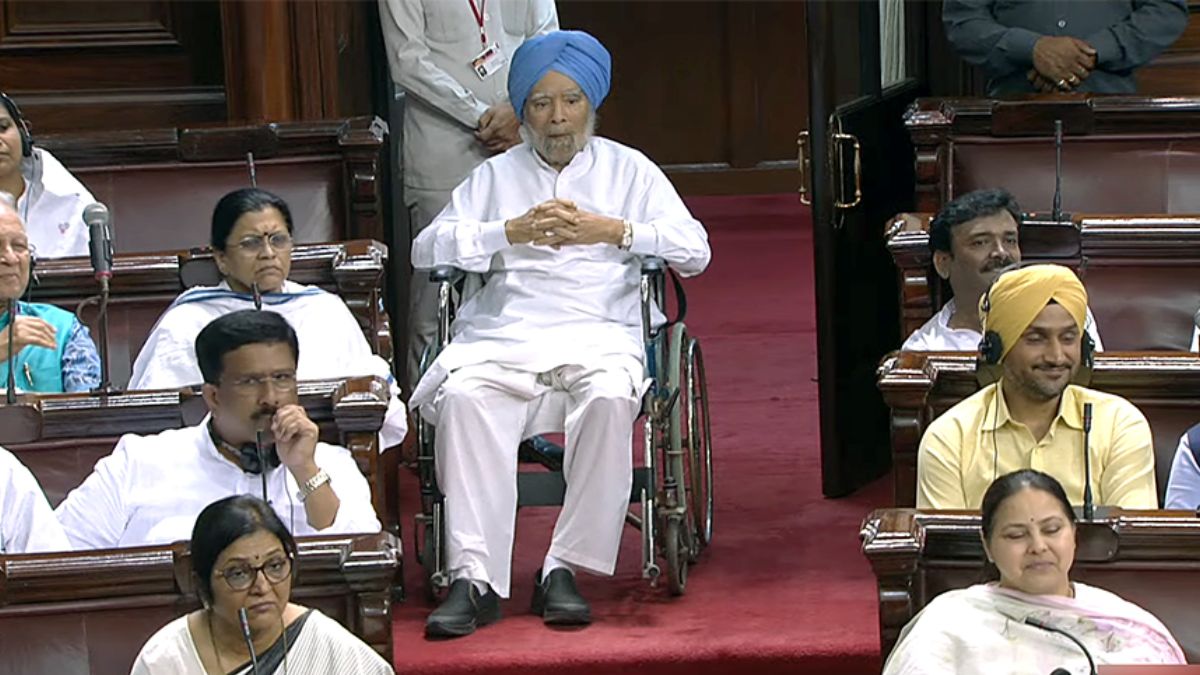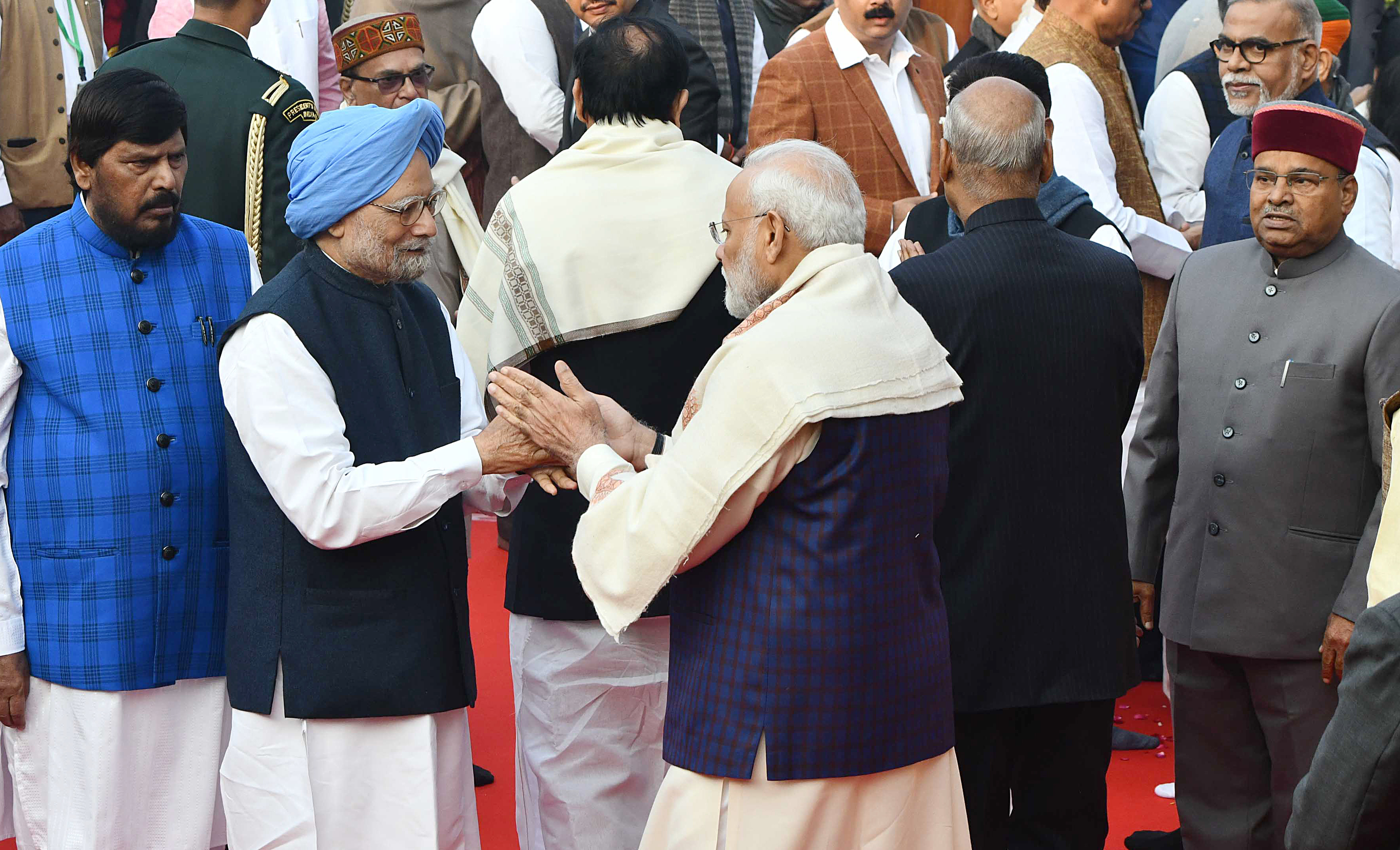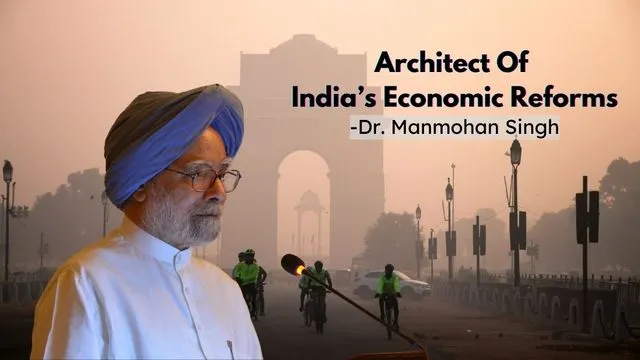- By Vivek Raj
- Wed, 03 Apr 2024 12:10 PM (IST)
- Source:JND
Former Prime Minister Manmohan Singh, renowned as the architect of India’s economic liberalisation and a stalwart in Indian politics, is set to complete his remarkable 33-year journey in the Rajya Sabha. Singh’s tenure has been characterised by his pivotal role in shaping India's economic policies and his distinguished parliamentary contributions.
Entering the Upper House in October 1991, Singh represented Assam for five terms before shifting to Rajasthan in 2019. Proficient in Urdu and English, he was revered for his eloquence and parliamentary acumen.
“No power on earth can stop an idea whose time has come. I suggest to this august House that the emergence of India as a major economic power in the world happens to be one such idea,” Singh said as he presented his first budget in 1991, which changed India’s fate forever.

Former prime minister Manmohan Singh signs after taking oath as a member of the Rajya Sabha, in the presence of his wife Gursharan Kaur, Congress interim President Sonia Gandhi and others, at Parliament House in New Delhi. (Image Source: AP)
While acknowledging the 1984 Anti-Sikh massacre, which took place under the leadership of former PM Indira Gandhi, Manmohan Singh said in Rajya Sabha, “I bow my head in shame”. Singh was also known to be an ardent lover of poetry and the upper house of the Parliament often echoed with couplets of poets like Iqbal, in his voice.
Remembered to be one of the most iconic exchanges between two rival leaders, Manmohan Singh stunned the Parliament when he replied to BJP leader Sushma Swaraj with one of Iqbal’s masterclass; “Maana ki teri deed ke kabil nahi hoon main, tu mera shauq to dekh mera intizaar to dekh”.
What Sets Him Apart?
Dr. Manmohan Singh, born on September 26, 1932, in Gah, Punjab (now in Pakistan), earned his Bachelor's and Master's degrees in Economics from Punjab University and later pursued his Doctorate from the University of Oxford, where he was a member of Nuffield College. Singh’s public service journey began in 1972 when he joined the government of India as an Economic Advisor to the Ministry of Foreign Trade. His tenure as the RBI Governor from 1982 to 1985 earned him recognition for his efforts in financial sector reform and economic stabilisation.

Former Prime Minister Dr Manmohan Singh attends the discussion on The Government of National Capital Territory of Delhi (Amendment) Bill, 2023 in Rajya Sabha (ANI Photo)
Then came 1991: Manmohan Singh was appointed as the Finance Minister of the country battered with poor economic conditions, high inflation and balance of payment crisis. Singh introduced major economic reforms for the country -- Liberalistaion, Privatisation and Globalisation (LPG) – which marked India’s entry into the global markets and transformed the economy from a socialist model to a market economy.
The LPG reforms paved the way for more opportunities for private companies in various sectors of the economy, boosted foreign exchange reserves, and also helped India overcome the BOP crisis.
Through Liberalisation, the policy allowed private sector companies to operate with fewer restrictions, enabling private players to expand and contribute to the country's growth. The new economic policy opened the Indian market to the globe, deepening economic integration in the world economy, which was earlier restricted.
During his tenure as Prime Minister, Singh spearheaded a series of transformative reforms, including the landmark Indo-US nuclear agreement in 2008 and the implementation of various rights-based legislations that revolutionised India's social welfare framework.

Prime Minister Narendra Modi greets Former Prime Minister Dr. Manmohan Singh as they arrive to pay tribute to Bhimrao Ramji Ambedkar on his 64th Mahaparinirvan Diwas. (ANI Photo)
In 2005, Singh introduced the National Rural Employment Guarantee Act (NREGA), ensuring employment for the rural populace. This legislation pledged to offer a minimum of 100 days of unskilled wage labor per fiscal year to every rural household.
Under his government Right To Information Act was passed, granting citizens the right to seek information from the government. His government also introduced initiatives such as Direct Benefit Transfer and launched Aadhaar, laying the foundation for modernising India's governance and welfare systems.
Commending Singh as “a hero of the middle class,” Congress Chief Mallikarjun Kharge said, “The nation misses the quiet yet strong dignity that you brought to the office of the Prime Minister. Parliament will now miss your wisdom and experience. Your dignified, measured, soft-spoken yet statesman-like words are in contrast to the loud voices filled with lies that signify the current politics.”
Singh's final intervention in Parliament was regarding demonetisation, where he labeled it as "an organised loot and legalised plunder." Singh was also criticised by the Opposition as a ‘Silent Prime Minister’.

